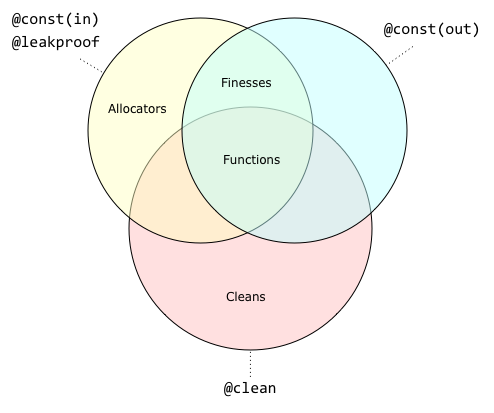Annotations - Spicery/Nutmeg GitHub Wiki
Overview
Annotations are additional information or modifications applied to a procedure that typically conveys the intent of the coder for how that procedure is to be used. You can stack as many annotations as you like in front of a procedure definition. e.g.
@clean
@const(in)
@leakproof
def add1( n ): n + 1 enddef
At this time there is no support for adding user annotations. This would count as a user-defined language extension, which is a planned feature.
List of Annotations
- @command - the procedure is an entry-point for the program when called from the terminal
- @unittest - the procedure is a unit test
- @allocator - the procedure is an allocator (
@transparent,@const(in)) - @sideffectfree - the procedure does not detectably mutate store (
@leakproof) nor detectably perform I/O (@soundproof). It is at liberty to use side-effects that are not detectable from the outside. - @clean - the procedure is written without
<--assignments or using I/O internally. It also only invokes other @clean or @sideffectfree procedures. This implies it is@sideeffectfree. - @finesse - the procedure is a finesse, which implies it is @sideffectfree, @transparent and @const.
- @function - the procedure is a function, which implies @sideffectfree, @transparent and @const.
- @leakproof - the procedure does not write to external mutable store.
- @impervious - the procedure does not read or write to external mutable store - internal store can be referenced. Note that being @impervious implies
@const(in). - @soundproof - the procedure does not perform any I/O.
- @transparent - the procedure is both
@imperviousand@soundproof. Hence its outputs depend only on the inputs so that the same inputs will always deliver the same results. - @const(in), @const(out), @const - the procedure only has const inputs, const outputs or both
- @val(in), @val(out), @val - the procedure only has val (or const) inputs, val (or const) outputs or both throughout
- @resource - the value is loaded at runtime from the resources
- @local, @nonlocal - scope within a block/endblock construct
- [@lazy][Lazy] - the procedure defers all arguments involved in function calls (i.e. yields futures)
Fundamental Annotations
The following annotations relate to core concepts in Nutmeg.
@clean@leakproof&@impervious@soundproof@const(in), @const(out), @const@val(in), @val(out), @val
Procedures fall into a rough hierarchy of function-ness in Nutmeg:
- General procedures that can do anything - just called procedures
- Allocators that can only use assignments on local store, only take
constinputs, do not do i/o - Clean procedures that can't use assignments or i/o but can only call cleans, finesses or functions - called clean procedures or 'cleans'
- Finesses that only accept and return
constvalues, do not perform i/o or assign non-local store and can only call other finesses or functions - Functions that only accept and return
constvalues, do not perform i/o, can't use side-effects and can only call other finesses or functions
They are related by which properties they have from
- Side-effect free: @clean - clean procedures and functions
- Do not affect non-local store: @leakproof - finesses, allocators and functions
- const inputs: @const(in) - finesses, allocators and functions
- const outputs: @const(out) - finesses and functions
